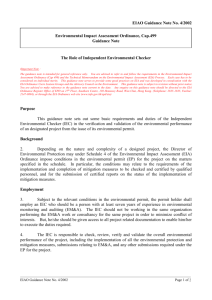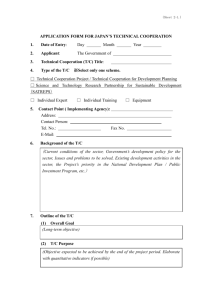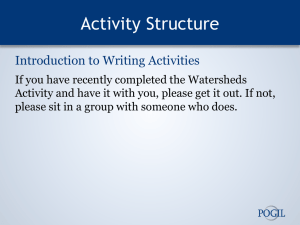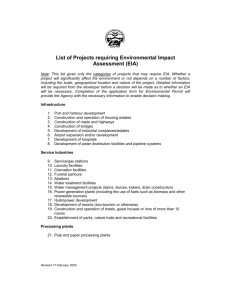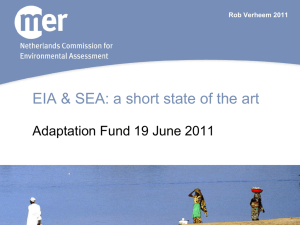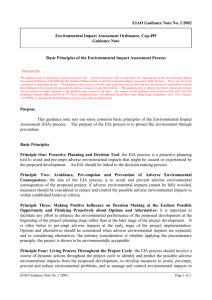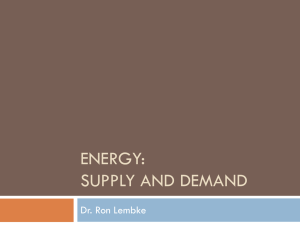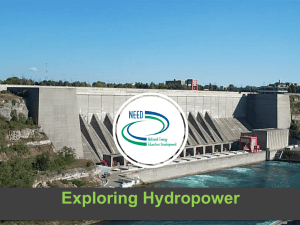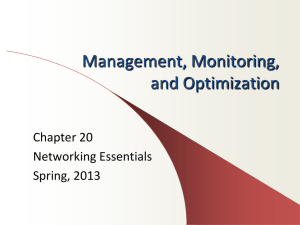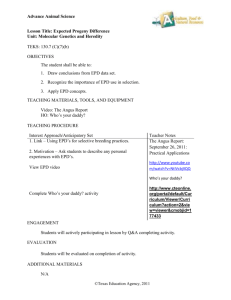Environmental Study Management Group
advertisement
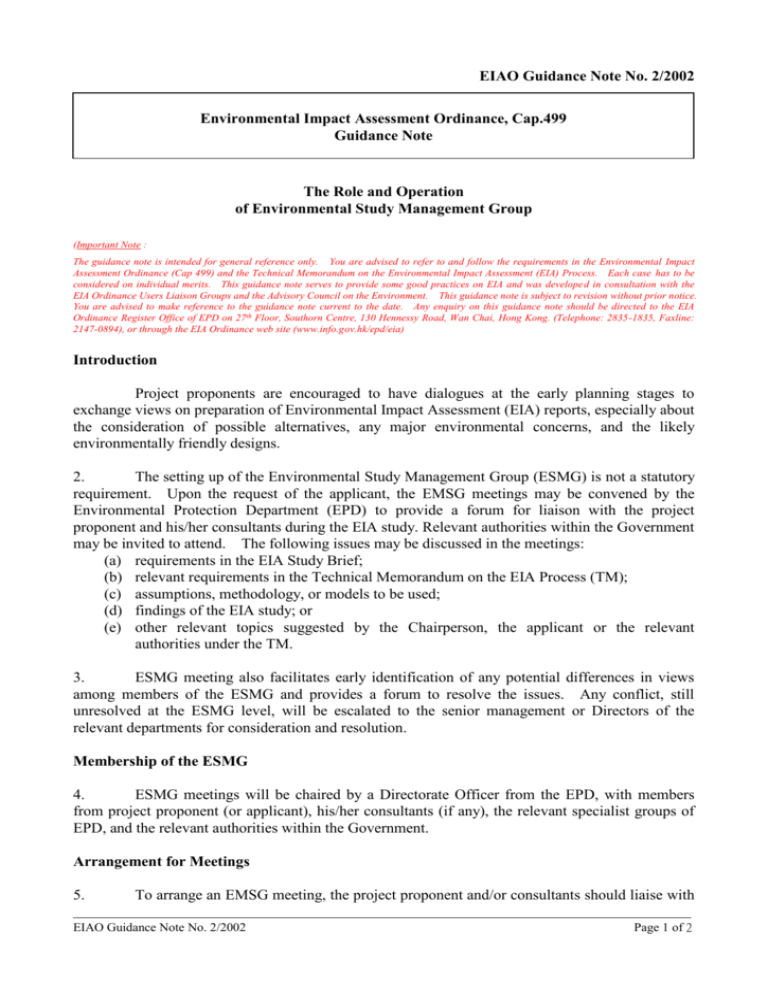
EIAO Guidance Note No. 2/2002 Environmental Impact Assessment Ordinance, Cap.499 Guidance Note The Role and Operation of Environmental Study Management Group (Important Note : The guidance note is intended for general reference only. You are advised to refer to and follow the requirements in the Environmental Impact Assessment Ordinance (Cap 499) and the Technical Memorandum on the Environmental Impact Assessment (EIA) Process. Each case has to be considered on individual merits. This guidance note serves to provide some good practices on EIA and was develope d in consultation with the EIA Ordinance Users Liaison Groups and the Advisory Council on the Environment. This guidance note is subject to revision without prior notice. You are advised to make reference to the guidance note current to the date. Any enquiry on this guidance note should be directed to the EIA Ordinance Register Office of EPD on 27th Floor, Southorn Centre, 130 Hennessy Road, Wan Chai, Hong Kong. (Telephone: 2835-1835, Faxline: 2147-0894), or through the EIA Ordinance web site (www.info.gov.hk/epd/eia) Introduction Project proponents are encouraged to have dialogues at the early planning stages to exchange views on preparation of Environmental Impact Assessment (EIA) reports, especially about the consideration of possible alternatives, any major environmental concerns, and the likely environmentally friendly designs. 2. The setting up of the Environmental Study Management Group (ESMG) is not a statutory requirement. Upon the request of the applicant, the EMSG meetings may be convened by the Environmental Protection Department (EPD) to provide a forum for liaison with the project proponent and his/her consultants during the EIA study. Relevant authorities within the Government may be invited to attend. The following issues may be discussed in the meetings: (a) requirements in the EIA Study Brief; (b) relevant requirements in the Technical Memorandum on the EIA Process (TM); (c) assumptions, methodology, or models to be used; (d) findings of the EIA study; or (e) other relevant topics suggested by the Chairperson, the applicant or the relevant authorities under the TM. 3. ESMG meeting also facilitates early identification of any potential differences in views among members of the ESMG and provides a forum to resolve the issues. Any conflict, still unresolved at the ESMG level, will be escalated to the senior management or Directors of the relevant departments for consideration and resolution. Membership of the ESMG 4. ESMG meetings will be chaired by a Directorate Officer from the EPD, with members from project proponent (or applicant), his/her consultants (if any), the relevant specialist groups of EPD, and the relevant authorities within the Government. Arrangement for Meetings 5. To arrange an EMSG meeting, the project proponent and/or consultants should liaise with EIAO Guidance Note No. 2/2002 Page 1 of 2 the subject officer of EPD to schedule the appropriate time for the meetings. EPD would endeavour to arrange the meeting within a month. At least one week in advance of the meeting, the project proponent should provide EPD with a list of discussion items and questions which he/she intend to clarify at the meeting. This should form part of the meeting agenda prepared by EPD for distribution to the relevant members for their early consideration and preparation. Management of the ESMG 6. The directorate officers from the EPD are responsible for chairing the ESMG meetings, overseeing the EIA process, resolving any issues of conflict, etc. In general, the subject officers in the Environmental Assessment Stream of EPD are the focal point for liaison with the project proponent (or applicant) and his/her consultants. 7. The relevant authorities and specialists are responsible for providing updated information and comments on the submitted report(s) to the subject officer to facilitate the preparation of the meeting. To avoid confusion and mis-understanding, no information flow should by-pass the subject officer to the project proponent and his/her consultants. Before the Formal EIA Process Begins 8. EPD encourages proponents to have ESMG meetings as early as possible, even before the commencement of the statutory EIA process. Before the Formal Submission of EIA Report under the Ordinance 9. ESMG meetings, if convened before the formal submissions of EIA reports under the EIA Ordinance, are to be conducted only on an administrative, advisory basis to help the project proponent to understand the requirements under the EIA Ordinance. The discussion and liaison at the meeting shall not in any case absolve the responsibilities of the applicant as stated in the EIA Ordinance. Any formal submissions by the applicant under the Ordinance shall be handled in accordance with the procedures and requirements in the EIA Ordinance and the TM. The priority of the officers in EPD and other relevant authorities would necessarily be given to those applications or reports formally submitted under the Ordinance. After the Formal Submission of EIA Report under the Ordinance 10. Except for straightforward cases, EPD would normally convene an ESMG meeting for the project with project proponent (or applicant), his/her consultants, and other relevant authorities to discuss the EIA report submitted under the EIA Ordinance. 11. The meeting is to provide a liaison channel for the applicant and his/her consultants to present their assessment. The discussion and liaison at the meeting shall not in any case absolve the responsibilities of the applicants as stated in the EIA Ordinance. Environmental Protection Department Date of issue : January 2002 EIAO Guidance Note No. 2/2002 Page 2 of 2
